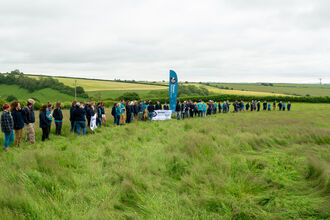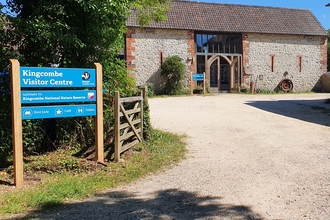
Wildlife and nature make a huge contribution to our wellbeing and quality of life; however, the natural world is in crisis. Driven by climate change and environmental degradation, nature is declining at an unprecedented rate. We must act now to reverse this decline by making more space for wildlife and habitats to adapt and recover on a grand scale. If we do that, then nature can help us to tackle the climate crisis by capturing carbon, contributing to flood defences and providing cleaner air, soil and water.
The world is waking up to the impact of climate change and nature loss on our lives and those of future generations and awareness of the need for change has never been higher. People are demanding action to address the climate and ecological emergencies and we need to inspire and empower people to take action for nature. Dorset Wildlife Trust is here to play a vital role in leading that change and enabling people who are clearly thinking globally to take action locally.
The next ten years are crucial for nature, and we look forward to a decade of change. We will work in partnership with people and communities, farmers and landowners, local businesses, our local authorities and other conservation organisations to deliver nature’s recovery.
We need as many people as possible taking action for nature and we hope that you will join us in making the 2020s a decade of transformation for the natural environment.
Brian Bleese
Chief Executive

A Wilder Dorset - a Dorset rich in wildlife, valued and nurtured by everyone will safeguard our natural world for future generations and enable people to live healthier and more fulfilling lives.
Our role is to lead the recovery and restoration of nature in Dorset and to raise awareness of the diverse range of opportunities for everyone to benefit from nature and get involved in its restoration. Whether that’s volunteering on a reserve, joining a youth activity group, an online talk or a guided walk, taking part in a wildlife survey or a community planting day. Nature is for everyone.

Together with the national partnership of 46 Wildlife Trusts, we have set ourselves two major challenges to help address the climate and ecological crises:
- More space for nature – by 2030 we want to see 30% of land and sea managed for the benefit of nature.
Nature has been pushed to the margins for too long. If wildlife is to recover it needs space and that can be in nature reserves, farms, parks, gardens and even road verges.
- Inspire and empower people – by 2030 we want to help 1 in 4 people to take action for nature.
In order for nature to recover, we need many more people on nature’s side. Evidence shows us that if 25% of the population – 1 in 4 people – visibly take action, we create a social ‘tipping point’, where the majority will follow.
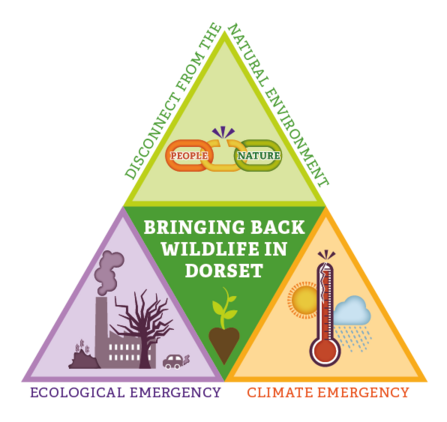
To make our vision a reality, we have committed to three specific and strategic goals to bring back nature to Dorset. We see it as our mission to do everything we can to achieve these goals and create a Wilder Dorset by 2030.
- Restore and expand habitats and the abundance and diversity of wildlife.
- Champion the natural environment, ensuring that people and wildlife benefit from local policies, decisions and management affecting land and sea.
- Inspire people and communities to learn about, value and act for wildlife and Dorset’s wild places. Our ambition is that 1 in 4 people in Dorset are involved with nature.
Delivering a Wilder Dorset
In delivering a Wilder Dorset, our work will focus on four key themes:
Wilder Places
Nature in Dorset is much less able to adapt to climate change in its damaged and fragmented state, or to help limit climate change. We need more of our land, freshwater habitats and sea managed for the benefit of wildlife. We aim to:
- Manage our nature reserves as exemplar wildlife hubs, showcasing Dorset’s habitats and giving our wildlife species, both rare and common, a place to thrive.
- Establish nature recovery networks on land and sea, working closely with neighbours, partners and stakeholders to agree long-term management that makes space for wildlife and supports communities and livelihoods.
A Wilder Voice
It is vital that the climate and ecological emergencies are taken account of in all land and sea management, policies and decision-making processes. We will continue to:
- Influence local land-use planning to ensure local policies and development protect and make space for wildlife and enable access to green spaces for everyone.
- Play a leading role in securing and managing Marine Protected Areas, Local Wildlife Sites and managing river and wetland catchments.
- Work closely with our partner Wildlife Trusts to develop and deliver policies and initiatives in a local, regional and national context.
Wilder Lives
Evidence shows that people who spend time in wildlife-rich places are more active and mentally resilient and enjoy better health. Add to that the significant role that volunteers can play in conservation work and it’s clear that we need to support individuals and communities to do more by:
- Providing accessible and practical opportunities for everyone to actively help manage, experience and find solace in wild spaces, particularly those who have not had the chance to do so before.
- Involving more people as volunteers on our nature reserves, at our visitor centres and supporting Dorset Wildlife Trust’s activities in a multitude of ways.
Aim for Net Zero
Nature can play a major role in capturing and storing carbon but we must also reduce emissions into the atmosphere. We aim to lead by example and reduce our carbon footprint to achieve net zero carbon emissions by 2030. In doing this we will both learn from and influence others who are on the same journey to address biodiversity loss and the impacts of climate change on their land and in their organisations. We as a charity must be resilient, efficient and fit for purpose whilst achieving the highest standards of environmental performance across our own operations.
Bringing back nature in Dorset
Across the county, we work in partnership with other conservation organisations, utility companies, landowners, farmers and councils on many projects ranging from safeguarding habitats and implementing scientific studies to engaging communities or pioneering conservation techniques such as rewilding.
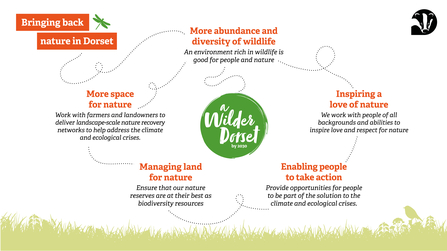
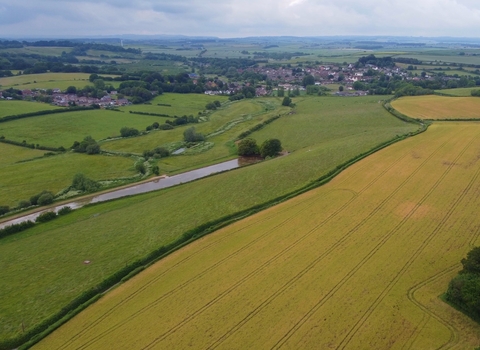
Court farm aerial - James Burland/Dorset Wildlife Trust
Wild Woodbury
A pioneering community-based rewilding project on 170 hectares of former agricultural land acquired by Dorset Wildlife Trust in 2021 just outside Bere Regis. The plan is to let nature take the lead, allowing woodland to regenerate naturally, creating wetlands and introducing mixed grazing. Regular surveys of the ecology, water quality and quantity, carbon storage and soils will measure changes over time. It is fully anticipated that rewilding will result in increased biodiversity and abundance of wildlife, improved carbon storage and healthier soils, reduction of pollutants including net nitrates entering Poole Harbour and opening up previously inaccessible areas of the land for the local community to use.
Brian Bleese
Wild Brownsea
Home to red squirrels and thousands of birds, Brownsea is a truly special place and over the past few years, extensive works and investment has been undertaken to refurbish the bird hides, deliver better access infrastructure and provide new observation and learning facilities. The outreach programme aims to engage with local groups, schools and people from all backgrounds and abilities to give them the opportunity to visit the Island and get involved with the Brownsea experience. In 2025, The Fine Foundation Lookout wildlife observatory was opened as well as a hands-on Nature Lab within the Wildlife and Wetlands Centre.
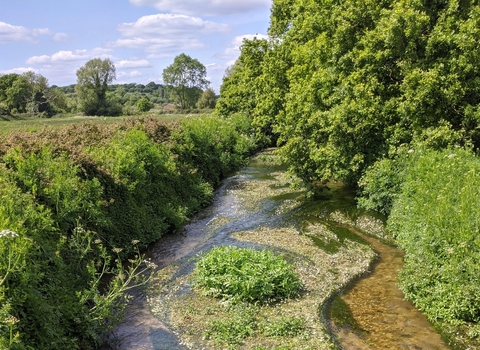
Dorset Wild Rivers
A joint initiative across the three Dorset Catchment Partnerships – Poole Harbour, Stour and West Dorset and Coastal Streams which aims to:
- enable plants and animals to thrive in rivers, streams and wetlands
- deliver clean water through tackling all sources of water pollution.
- provide protection against flood risk by working with natural processes.
- work with farmers, land managers and the wider public.
Projects have included monitoring crayfish on the Cerne, the Piddle Valley natural flood management project, enhancing the Allen and Hooke chalk streams, the great crested newt project, re-introducing beavers into the Poole Harbour catchment and riverfly monitoring.
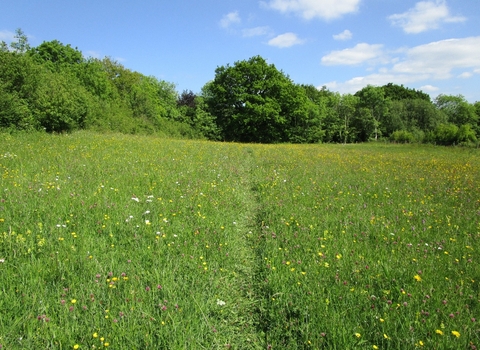
Wildflower meadow at Kingcombe Meadows Nature Reserve © Debbie Billen
Kingcombe NNR
In 2021, Kingcombe Meadows and Powerstock Common reserves were declared a National Nature Reserve (NNR) by Natural England encompassing 309 hectares of grassland, woodland and scrub. Kingcombe Meadows is managed as a working farm with grazing animals without the use of pesticides or artificial fertilisers resulting in a patchwork of unimproved flower-rich grassland, thick hedges and woodlands along the River Hooke. Powerstock Common brims with rare and protected species amongst an intricate mosaic of unimproved grassland, scrub and woodland. This designation secures both reserves’ future as part of the growing national nature recovery network providing vital space for wildlife to spread and regenerate.
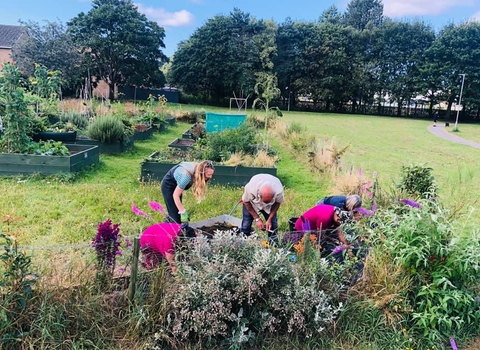
Urban Wildlife
Dorset Wildlife Trust has led work on wildlife conservation in our urban areas of south eastern Dorset, Weymouth, Portland and other towns for many years. Our projects provide practical support for people and communities to get involved with nature, transform green spaces, improve their local area for the benefit of residents whilst also creating more wildlife-friendly environments. The aim is that looking after green spaces will evolve and grow to become a long-term feature of community life and that more people can easily make nature a normal part of their lives.
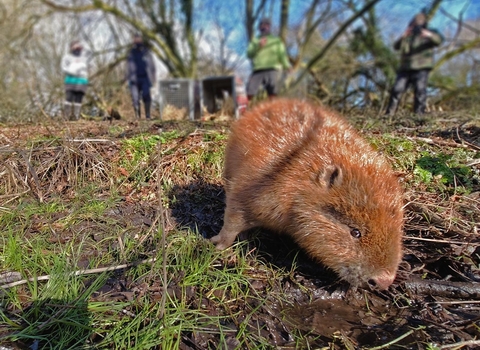
James Burland
Beavers back in Dorset after 400 years
In February 2021, we released two adult beavers into an enclosed site in West Dorset under licence as part of a five-year scientific study to assess the impact of beavers on their environment. We are working with Exeter University and Wessex Water to monitor water quality, water flow and changes in biodiversity as well as addressing potential management issues. As natural ecosystem engineers, beavers create their own wetland within a river catchment which has potential benefits in capturing carbon, regulating waterflow thereby reducing risk of flood and improving water quality as harmful nitrates and phosphates settle into the sediment.
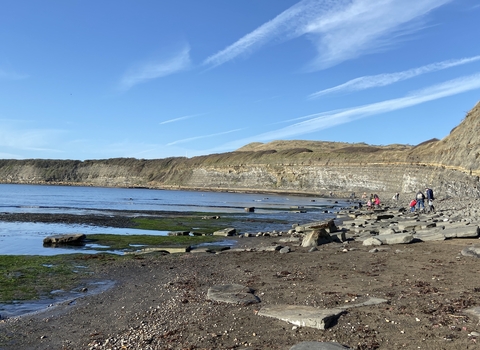
Hazel Ormrod
Wild Seas
Dorset is home to six Marine Conservation Zones and 142km of coastline with precious underwater habitats ranging from deep, tide-swept rocky cliffs to seagrass meadows. Our marine team works to safeguard these habitats from the damaging effects of climate change, pollution and invasive species. With the help of volunteers, we survey climate-change indicator species such as the furrowed crab, collect valuable information on seabed habitats and organise regular beach cleans. Alongside that, our coastal centres at Kimmeridge, Chesil and Brownsea help individuals and families to explore the wonderful world of marine life and to understand why it needs protecting.
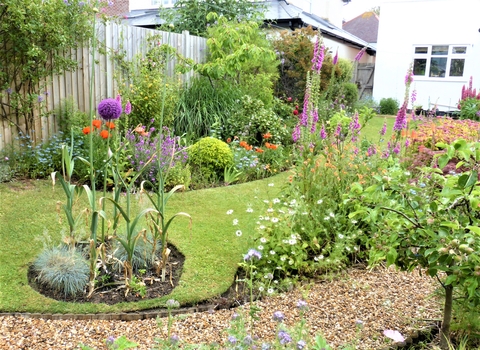
Wildlife garden - Katie Wilkinson
Wildlife-friendly gardening across Dorset
Large or small, ledge or courtyard, gardens are part of a mosaic in a wider network of natural havens linking urban green spaces with nature reserves and the countryside. Encouraging more people to manage their gardens to benefit wildlife creates mini stepping stones across our towns and villages to help wildlife find food, water, shelter and places to breed. Together, they create a living landscape where wildlife can thrive. Replacing a fence with a hedge, choosing plants to attract butterflies and bees, growing veg, introducing a water feature – the possibilities for wildlife-friendly gardening are endless and have the added bonus of enhancing human wellbeing and physical health too.
Get involved with Dorset Wildlife Trust
Now you’ve read our strategy, we hope you will feel inspired to take action for nature.
Together, we can create a Wilder Dorset rich in wildlife and valued by everyone.

